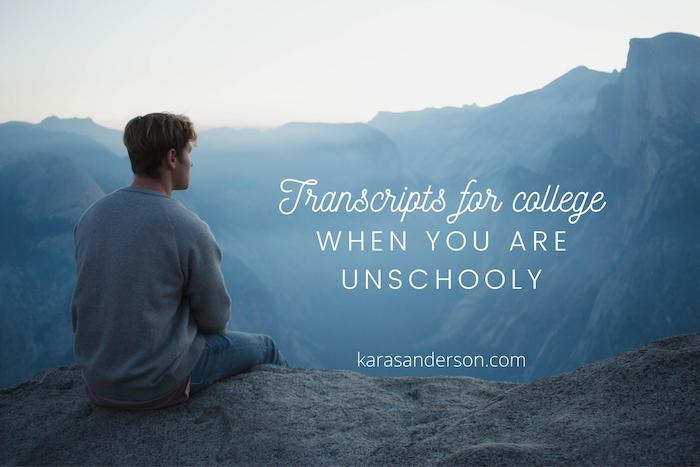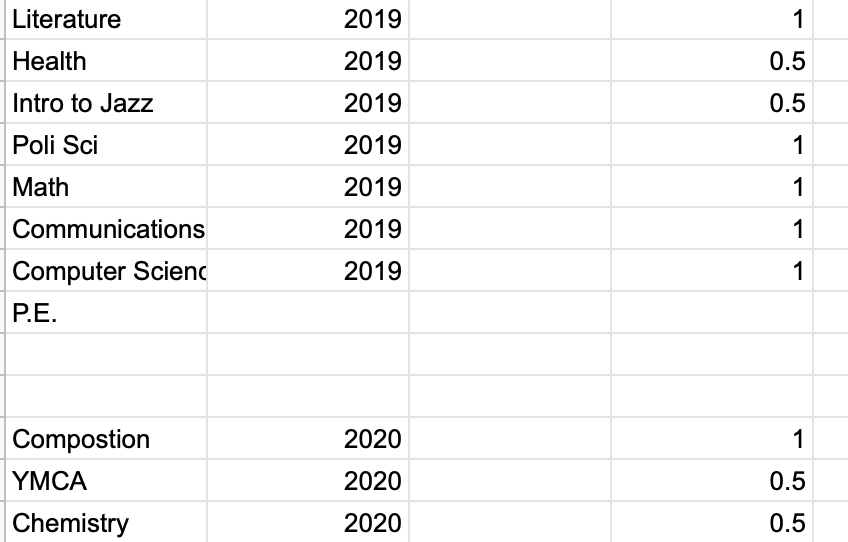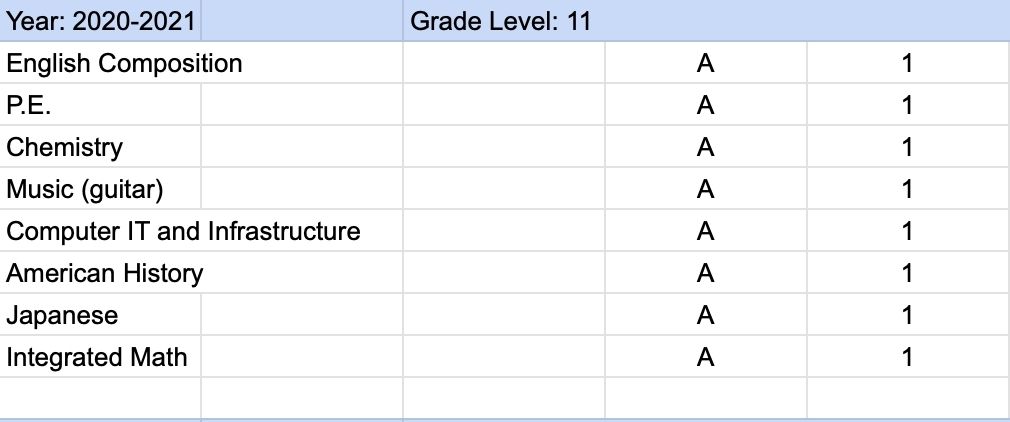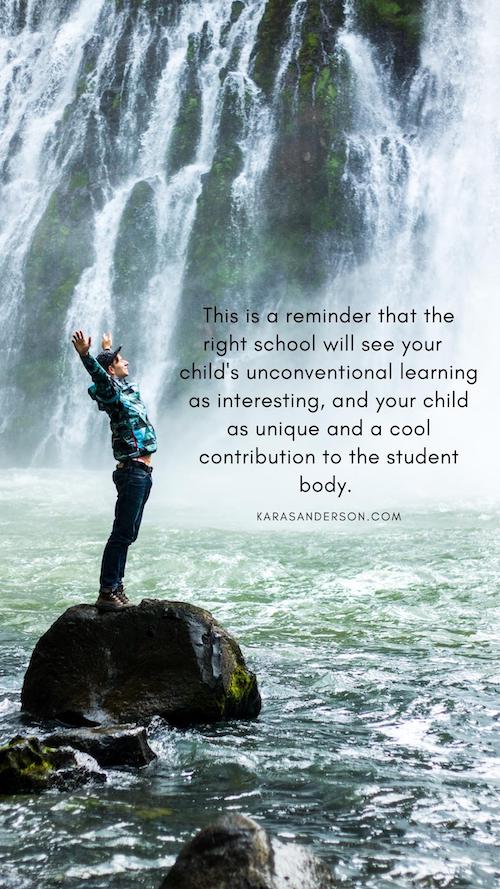
I got a message this weekend that reminded me that I keep promising to write a thing about transcripts when you are unschooly.
(Thank you, Stephanie! 💙)
Transcripts make every homeschooler I know sweat, but there is a specific concern when you are what I call “unschooly.”
I use that term to describe homeschool families who follow their kids’ lead, and do not necessarily follow a certain curriculum, but may make use of curriculum materials, classes, or other “formal” modes of learning.
(I’m not sure how this lines up with true unschooling as defined by John Holt, so for the purposes of this post, I’m going to avoid using the terms unschoolers or unschooling to refer to what we do. I do however strongly recommend John Holt’s books for further exploration.)
It’s All Going to Be OK
As you can imagine, when you are unschooly (or “relaxed homeschoolers”) learning can be a little hard to track, and often doesn’t follow a consistent routine.
And yet I promise, our kids learn.
So before I jump in, I’d like to say that it’s probably all going to be OK.
My son was definitely unschooly, and I would say even resistant to a lot of formal learning growing up, and he still started classes at our local college at age 16 through early enrollment, and got into his first college of choice at a competitive school.
So I want to reassure you that it can work out – your unschooly kid can get into college if that’s their desire.*
This post will outline what we did.
Start Early
I have a funny story in my book about how I wanted to start keeping a transcript in middle school, because as with so many homeschooled kids, mine sometimes took classes or were exploring interests that could easily count toward high school credits – like foreign language or science classes.
The punchline to this story is that I was very concerned about starting this in 7th grade, and technically middle school starts here in 6th grade.
But my advice is to begin to track your child’s learning around 7th or 8th grade.
This doesn’t have to be anything complicated – you can just keep a record somewhere (I like a spreadsheet for this, but it can also be handwritten) of what classes and learning your kids do. If it’s a class, keep track of the class name, dates and a simple description.
I promise, this will be so helpful later.
In our case, we literally were required to enter each class one at a time on the college’s site as part of the application process. I would have been lost without notes.

Calculating Credits and Units
When I started to feel stressed about keeping a transcript, I reached out to my friend Melissa who is more firmly in the Unschooling camp. I asked her for advice on how to keep track of what my kids were learning when it all seemed very nebulous.
She introduced me to a system that has helped us be able to better track my kids’ interest-led learning:
From Melissa:
“A year-long class is one ‘unit,’ a semester-long class is ½ unit.
A unit = between 120-180 ‘Carnegie units’
A Carnegie unit = 1 hour of instruction or 2 of practice
We counted reading, YouTube videos, curriculum, any kind of lessons, and discussion as ‘instruction.’ We counted hands-on stuff that didn’t involve new learning or processing as ‘practice.’”
By following this system, you can start to see how to track what your kids are learning and how to begin building a transcript.
Plan From Behind AKA ‘Cactus Schooling’
This system works well with what many relaxed homeschoolers refer to as “planning from behind.”
Planning from behind is essentially writing down what your kids do after they do it, instead of planning FOR your kids.
In our home, this morphed into what we call “Cactus Schooling,” wherein I create a plan, but hold it loosely, like you’d hold a cactus.
Cactus Schooling has allowed us to set goals together and to “fill gaps,” necessary for graduation, but also for my kids to follow their passions, which I believe leads to learning that really “sticks.”
Graduation Requirements
Now speaking of graduation requirements, it might be helpful to look into two things:
- graduation requirements in your state/school district
- any specific requirements if your child has a specific major and/or school in mind
For Step 1, we looked at our local board of education’s requirements to figure out what it takes to “graduate” your child. I literally Googled the name of my school district +” graduation requirements.”
This gave us any idea of how many years of math, science, history, etc. were required here, for public schooled kids (meaning this was just for reference).
To give you an idea, in our school district, this is the breakdown:
- 4 years of English
- 3 years of Social Studies
- 1 year global studies
- 1 year U.S. History
- 1 semester Civics and Government
- 1 semester Economics
- 3 years Math
- 3 years Science
- 3.5 years Physical Education
- 1 semester Health
- 1 year Art, Music, World Language (including American Sign Language)
- Plus Electives to bring your total to 48 total credits
We did not tailor my son’s learning to the requirements of a specific school or major, but based on credits required, you can probably see where you could add advanced classes or study in a special area to help prepare your child for a certain college or further course of study.

Flipping things around (remember, you homeschool)
I was telling a friend last night about this post and researching what our board of education requires for graduation from public school, and she told me that in her area, high school graduation requires just one semester of physical education.
So this leads me to two points:
- Don’t get too hung up on what your local board of education requires, because your child may want to go to a college in another state (or at least another school district) where everything is different. None of this is universal.
- There’s another way to look at things altogether – you do not have to follow your state board of education’s requirements at all because your child doesn’t go to a public school and you are not trying to graduate them with a public school diploma. In fact, in certain states like New York, homeschooled kids can’t even legally be issued diplomas.
But don’t worry about that. Homeschoolers don’t need diplomas – what they need instead is a way to show what they’ve been learning, which is where transcripts come in.

What Do I Call It?
That can be a little challenging to create when you have unschooly kids, because some of what they do might be really hard to classify. You may not know what to call a given “class.”
Can I suggest here that unless your kid is going to a very fancy or very small school, probably no one is looking that closely?
For instance, I share in my book that my kids have never really loved math. Plus, we practice more of a “mastery method” here, meaning we don’t move on until my kids really understand the concept.
So my friend Shawna suggested using the term “integrative math,” on transcripts.
(Later we started Mr. D Math and this solved the bigger issue of a math-phobic mom trying to teach math.)
My advice is to simply do what works in your family, and classify how you need to for transcript purposes.
Did you do a Shakespeare Unit? Call it “Shakespeare Study” or “English Year 2, Semester 1 – Studying the Plays of Shakespeare.”
Is your child taking ceramics?
Call it Ceramics I (first semester) and Ceramics 2 (second semester) or “Art – Study of Ceramics.”
The right school will see this stuff as interesting and making your child unique and a cool contribution to the student body.

What’s the Goal for College?
Sometimes, I think we get so wrapped up in trying to help our kids’ dreams come true, that we forget some simple truths.
College is expensive. It’s a huge commitment. So my advice is don’t make the goal to make it into a specific school, or even to get your child started in a specific major (unless they are really, really all-in on something.)
If you are relaxed homeschoolers you’ve probably eschewed “standards” for years so that your kids could learn how they learn best.
So stop trying to make your child fit a school, and instead look for schools that fit your kid.
This book provides great inspiration in that exact area.
Extra Resources:
A couple of places to head for more help include HSLDA.org, where you can look at your state/country’s requirements for homeschooling and my friend Heather, who specializes in helping out-of-the-box kids get into college.
Here is a tool to help you calculate a cumulative GPA.
Best of luck! 💙
* Just a note that I know all kids do not want to pursue college and some may choose to take a gap year or six. I still think it might be helpful to keep a transcript for your kids even if they don’t plan to pursue college. Things might change down the line, or they may need a transcript for an apprenticeship or something else. You never know.
